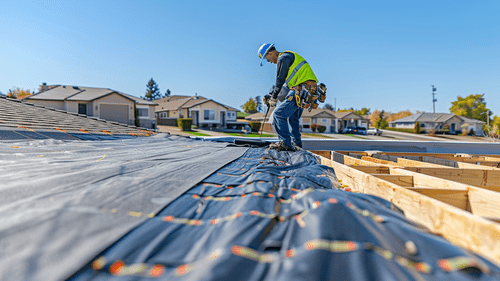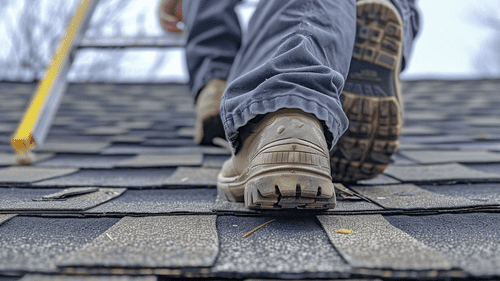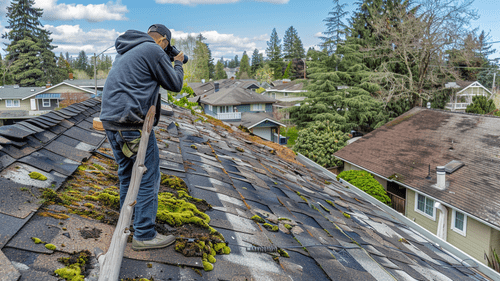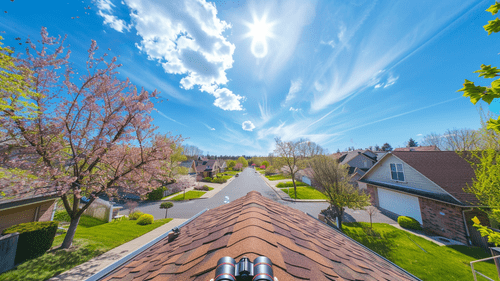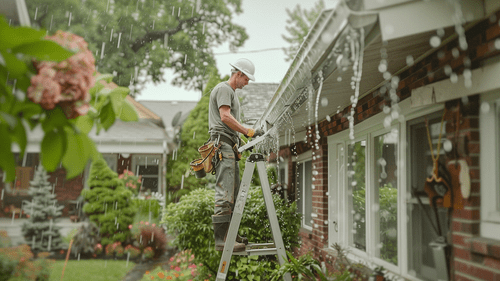In your quest to protect your home, you’ll encounter enticing offers, promises that are appealing, and deals that seem unbeatable but are common roofing scams. However, it’s crucial to be aware of the tactics used by fraudulent roofers who prey on your desire for a quick and affordable fix.
From storm chasers to the bait-and-switch of mysteriously low bids, knowing what to look out for is your first line of defense. But how can you distinguish between a genuine offer and a scam? The answer lies in understanding the signs of deceit, which we’ll explore further, equipping you with the knowledge to safeguard one of your most valuable assets.
Recognizing the Red Flags: Common Roofing Scams Unveiled
To protect your home from roofing scams, it’s essential to recognize the warning signs. Be on the lookout for storm chasers who use high-pressure sales tactics to exploit homeowners in the aftermath of severe weather. These unscrupulous individuals often lack proper licensing and insurance, putting your home at risk of subpar, shoddy work.
Another red flag is unrealistically low bids that may balloon into unforeseen expenses due to poor quality work or additional “discovered” issues. Scammers may also use exaggerated damage claims to pressure you into making quick decisions, preying on your concern for your home’s safety.
Insurance fraud is another aspect to be wary of, with scammers potentially inflating invoices or offering to cover your deductible as a means to entice you. By understanding these common roofing scams, you can take proactive steps to protect your home and your wallet.
The Top Five Roofing Scams to Avoid
- The Deceptive Dance of Out-of-State Storm Chasers
In the wake of severe weather, out-of-state storm chasers swoop into affected neighborhoods, using high-pressure tactics to convince homeowners that their roofs desperately need repair or replacement. These individuals often lack proper licensing and insurance, putting your home at risk of subpar work and potential legal issues.
To avoid falling victim to out-of-state storm chasers, always be wary of unsolicited offers and insist on verifying the legitimacy of any roofing contractor. Don’t let persuasive tactics rush you into making a decision that could lead to regrettable outcomes. Take the time to research and choose a reputable, local contractor with a proven track record of quality work and customer satisfaction.
- The Pitfalls of Too-Good-to-Be-True Bids
When considering roofing contractors, be cautious of bids that seem too good to be true. Extremely low bids can be a red flag for roofing scams, indicating that the contractor might use subpar materials or unskilled labor, leading to hidden costs and additional issues down the line.
While it’s tempting to go for the lowest offer, remember that quality often suffers when contractors cut corners. These contractors may not have proper insurance or licensing, exposing you to significant risks and potential legal complications.
Before being swayed by a bargain, thoroughly research the contractor and insist on seeing proof of their insurance and licensing. Don’t let low bids trick you into settling for poor workmanship. Invest in a fair-priced bid that guarantees the longevity and quality of your roof, avoiding potential scams and additional charges later on.
- Unmasking the Mystery Damage Scam
Be on guard against contractors who claim to have discovered mysterious or greatly exaggerated damage on your roof after a quick inspection. These claims can often be unfounded and a tactic to pressure you into expensive, unnecessary repairs.
Always request proof of any alleged damage, as legitimate contractors will provide detailed documentation and photos to support their claims. If something doesn’t add up, seek a second opinion from a reputable roofing professional to confirm the legitimacy of the damage and prevent falling victim to an expensive scam.
- Navigating the Permit Procurement Ploy
Another roofing scam to watch out for involves contractors urging homeowners to secure permits themselves. This tactic allows them to skirt legal obligations and may compromise the quality of your roof. By pushing the responsibility of obtaining permits onto you, these contractors dodge their legal responsibilities, potentially leading to work that doesn’t meet building codes and leaving you with a subpar roof and potential legal issues.
To protect yourself, ensure that any contractor you hire has the necessary permits before they start on your project. Avoid those who try to shift this responsibility onto you. Remember, legitimate contractors will handle all aspects of permit procurement, adhering to building codes and regulations to ensure your roof is done right.
- The Deceptive Lure of Discounted Materials
Be wary of roofers tempting you with discounted materials, as this can be a one-way ticket into the heart of roofing scams. These contractors offer materials at markedly lower prices, claiming you’ll save money. However, this often means they’re skimping on quality and durability.
Such materials may not meet industry standards, leading to quicker deterioration, more frequent repairs, or even a full replacement much sooner than anticipated. Always prioritize quality and durability over initial cost savings, and don’t hesitate to ask for detailed information about the materials to verify they adhere to industry standards.
Additional Red Flags to Watch Out For
- The No-Contract Conundrum: Insist on a contract to protect yourself from potential roofing scams, even if a contractor suggests bypassing a formal agreement. A contract provides a clear outline of the project scope, timeline, materials, and pricing, ensuring that both you and the contractor understand what’s expected.
- Resisting High-Pressure Sales Tactics: Don’t let high-pressure sales tactics turn your roofing project into a nightmare. Be cautious of contractors who offer immediate quotes and urge you to sign contracts right away, as these aggressive strategies exploit your sense of urgency.
- Evading the Large Down Payment Trap: Another red flag to watch out for is contractors demanding a significant down payment before starting any work. This practice is a hallmark of roofing scams, as reputable contractors typically request a small deposit, around 10% of the total cost, rather than a hefty upfront payment.
- Verifying the Online Presence: In today’s digital age, a contractor’s absence from the online world can be a significant red flag, signaling potential unreliability. Legitimate roofing companies usually showcase their work, customer reviews, and contact information on websites and social media platforms, demonstrating transparency and allowing you to gauge their reputation.
- Safeguarding Against Insurance Fraud: Exercise caution when filing an insurance claim, as some contractors may attempt to commit insurance fraud by submitting inflated invoices. If a contractor promises to reimburse your deductible, it’s a red flag for fraudulent practices.
- Steering Clear of the Cash Payment Request Scam: Be wary of contractors who demand cash payments upfront, as this is a classic sign of a roofing scam aimed at dodging accountability. Legitimate contractors typically shy away from cash transactions because they lack transparency and make it difficult to track the exchange.
- Ensuring Proper Insurance and Licensing: Always ensure your contractor has proper insurance and licensing for your roofing project. Falling for roofing scams by hiring unlicensed and uninsured contractors can lead to numerous problems, including being held liable for any accidents or damages that occur during the project.
Your Roof, Your Fortress: Staying Vigilant Against Roofing Scams
In the quest to safeguard your home, it’s crucial to stay vigilant against the various roofing scams that can leave you vulnerable and your wallet emptier. By understanding the red flags and common tactics used by unscrupulous contractors, you arm yourself with the knowledge needed to make informed decisions and protect your most valuable asset.
Remember to be cautious of storm chasers, unrealistically low bids, and claims of unseen damage. Don’t fall for permit procurement ploys or be swayed by contractors with no online presence. Stay alert for signs of insurance fraud and cash-only deals, and always verify that your contractor has a valid license and insurance.
By staying informed and proactive, you can confidently navigate the world of roofing and ensure that your home remains a secure, well-protected fortress. Trust your instincts, do your research, and never hesitate to seek a second opinion if something doesn’t feel right.
Your roof is your first line of defense against the elements, and by taking the necessary precautions against roofing scams, you invest in the long-term safety, comfort, and value of your home. Stay sharp, stay vigilant, and rest easy knowing that you’ve taken the steps to protect your home and your peace of mind.

